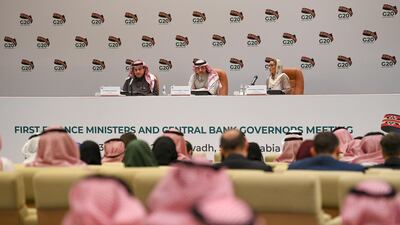Financial policymakers from the world’s 20 largest economies pledged “to take further actions” to support the global economy amid fears the coronavirus outbreak is hampering growth.
The Group of 20 finance ministers and central bank governors said it was ready to roll out fiscal and monetary measures to bolster the response to the virus, as ratings agency Moody’s Investors Service revised its growth forecasts for all G20 economies amid the health crisis.
“We are ready to take further actions, including fiscal and monetary measures, as appropriate, to aid in the response to the virus, support the economy during this phase and maintain the resilience of the financial system,” the G20 said in a joint statement in Riyadh on Saturday.
The group added that it "welcomed" the measures already put in place by some countries to support economic activity and the steps taken by international organisations such as the International Monetary Fund and the World Bank Group to help member countries respond to the virus. Earlier this month the IMF allocated $50 billion (Dh183.6bn) in emergency funding to poor and middle-income countries while the World Bank set up an initial fund of $12bn to help member-countries cope.
The latest G20 comments come at the end of a week that saw the Covid-19 virus spread to more than 70 countries, with over 100,000 cases and about 3,400 deaths. The Federal Reserve issued an emergency rate cut to calm investors while oil prices fell 9.44 per cent to settle at $45.27 per barrel on Friday and stock markets continued to slide as investors panicked over the effect of the coronavirus on the global economy.
Moody's revised the baseline growth forecasts for G20 economies to 2.1 per cent on Friday, 0.3 percentage point lower than the previous baseline, while China's 2020 growth forecast was also reduced to 4.8 per cent from the previous estimate of 5.2 per cent.
The US economy is expected to grow 1.5 per cent, down from the previous estimate of 1.7 per cent, Moody's said.
Weak demand will translate into generally subdued commodity prices and oil prices will remain volatile, the ratings agency said.
"Several plausible developments could lead to a far more negative scenario than our baseline forecast," said Moody's Vice President Madhavi Bokil. "A sustained pullback in consumption, coupled with extended closures of businesses, would hurt earnings, drive layoffs and weigh on sentiment. Such conditions could ultimately feed self-sustaining recessionary dynamics."
S&P Global Ratings said earlier this month that the industries most impacted by the outbreak will be those reliant on consumer discretionary spending, such as travel and high-end retail, with cross-border supply chains, such as cars, electronics and chemicals, particularly exposed from a credit perspective, with increased pressure on revenue and earnings.
Resumption of normal economic activity will depend on how long it takes to contain the global spread of the virus, Moody's said, with the response from fiscal authorities, central banks and international institutions likely to be strong and targeted.
The latest G20 statement stressed the need for global cooperation "to mitigate risks to the global economy from unexpected shocks”.
“To this end, we are working closely with the IMF, the WBG, the Organisation for Economic Cooperation and Development and the Financial Stability Board, and support strong coordination with the World Health Organisation, in particular with a view to sharing information, assessing needs and devising policy options that countries can implement in response to Covid-19 outbreak,” it said.
The group said it is committed “to use all available policy tools to achieve strong, sustainable, balanced and inclusive growth, and safeguard against downside risks”.
On Friday the International Institute of Finance said global growth in 2020 could “conceivably” approach 1 per cent, down from 2.6 per cent last year, due to the economic fallout from the coronavirus outbreak. The estimate would be the weakest growth since the 2008 global financial crisis, according to the global association of the financial industry.
Earlier this week, the IMF said it sees 2020 global growth falling below last year’s level of 2.9 per cent, but managing director Kristalina Georgieva said “how far it will fall, and for how long, is difficult to predict”. In January, the IMF projected global growth of 3.3 per cent for 2020.


